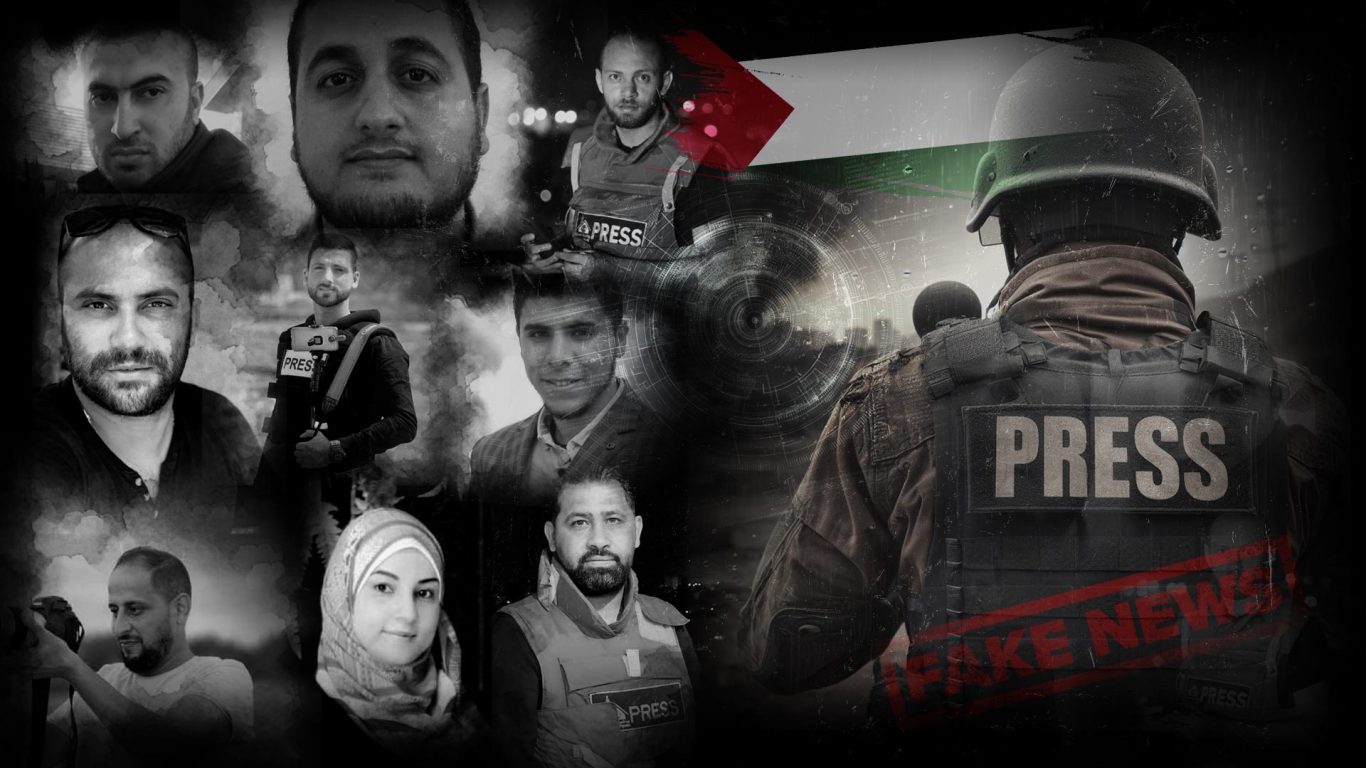Gérald Darmanin informed prefects by telegram that "pro-Palestinian protests must be banned because they are likely to disturb public order." Since that decision, dozens of people have been fined simply for demonstrating. Some have even been taken into police custody for advocating terrorism.
"I was in Paris to show my support. Police officers were everywhere, and they didn't really say anything at first, but then they started fining everyone. I had to pay 135€ even though I was just expressing my support," said Rania*, who has been living and studying in Paris for the past two years.
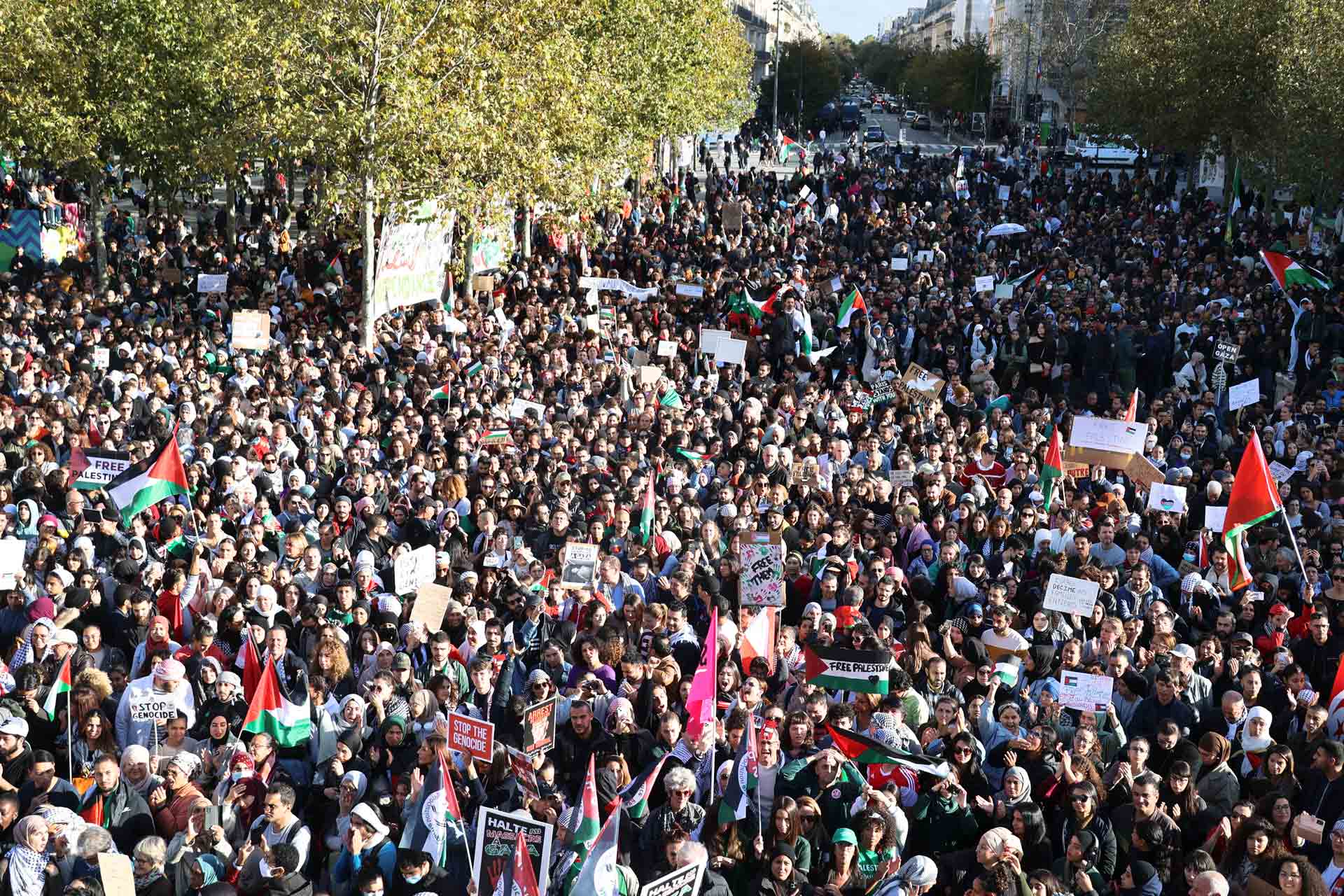

Demonstration in support of Palestine in Paris, October 22, 2023. Photo credit: Timothée Forget
The right to demonstrate in jeopardy
The President of Amnesty International France, Jean-Claude Samouiller, believes that " the ban on all demonstrations in support of the Palestinians in France constitutes a serious and disproportionate attack on the right to demonstrate". He also pointed out that a ban on protests "can only be legal if it is motivated by a specific threat and if it is demonstrated that no other less restrictive measure could guarantee public order."
Meanwhile, protests in support of the Palestinians have been taking over the streets all over the world. Thousands of demonstrators marched through New York, Tokyo and Sydney to express their outrage at the genocide being perpetrated against the Palestinian people. In Europe, over 100.000 people took to the streets of London on Saturday October 21 to call for a ceasefire in Gaza.
Germany - where the largest Palestinian diaspora in Europe is based in the capital Berlin - and France have adopted a similar, uncompromising stance, despite the French Council of State's opposition to the bans. This decision echoes other official statements, such as the one made in 2016 by then Prime Minister Manuel Valls, who claimed that the words anti-Zionism and anti-Semitism were synonymous, confusing the fight against Israel's abusive policies with anti-Semitism.
Pierre Stambul, spokesman for the French Jewish Union for Peace (UJFP), considers the disregard for fundamental freedoms to be part of a global context, which began with "the repression of the yellow vests, violence against migrants, and unpunished police brutality." "France is becoming an 'illiberal' country like Hungary or Turkey, where fundamental freedoms are violated," he told inkyfada.
"The attempt to criminalize support for Palestine and anti-Zionism, to ban demonstrations and arrest activists, is just taking things too far," says the activist. "France is unconditionally supporting an extreme right-wing supremacist government that is committing crimes against humanity."
According to the Palestine Action Committee, this measure is also considered a "serious and manifestly illegal violation of a fundamental right, namely the freedom to demonstrate". The government had attempted to dissolve the association in 2022, but the Council of State suspended the decree. Following this decision, the Palestine Action Committee filed a freedom summary proceeding with the Administrative Court on the same day, with the aim of allowing the protests to take place.
The Council of State ruled on Wednesday October 18 that Beauvau's instructions to prefects, sent by telegram, "do not constitute a serious and manifestly illegal infringement of freedom of demonstration and freedom of expression".
It recommended that demonstrations be examined on a "case-by-case" basis, but added that "no ban can be based solely on this telegram or on the mere fact that the protest is in support of the Palestinian population". This decision allowed demonstrations to take place under heavy security, as was the case in Paris on Sunday October 22.
In doing so, France and Germany have set themselves apart in Europe for being the only countries to ban outright demonstrations in support of Palestine. While Giorgia Meloni flew to Israel to meet with Benjamin Netanyahu, her far-right government's Foreign Minister Antonio Tajani was highly critical of the French decision. "France makes its own choices, but banning protests in a democratic country doesn't seem right to me," he said.
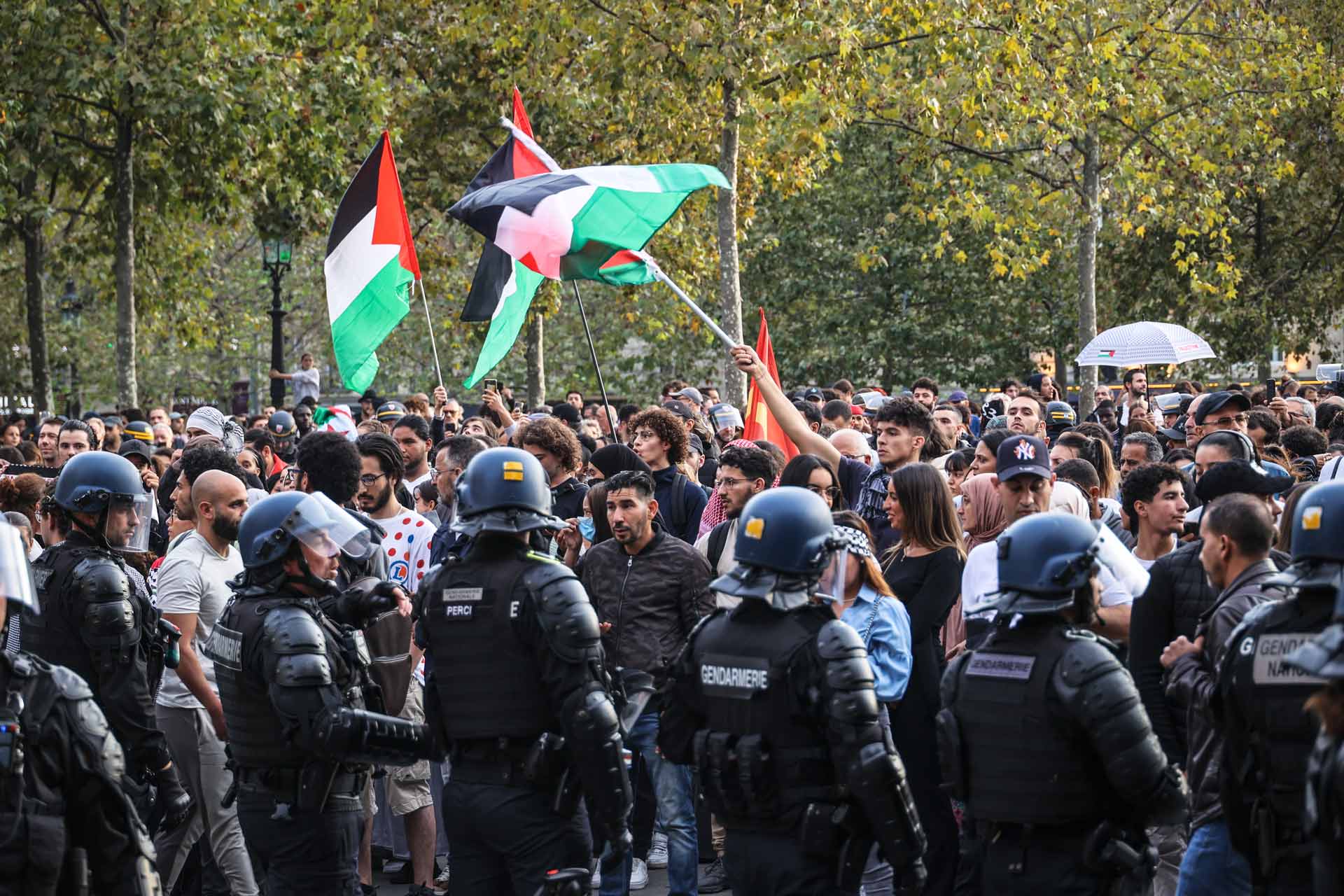

Thousands of people demonstrate in support of Palestine in Paris on October 22, 2023, amid heavy police presence. Photo credit: Timothée Forget
“I'm obviously scared”
In the telegram banning demonstrations, Gérald Darmanin recommended arresting protestors, firmly instructing prefects that "anyone arrested must of course be brought before the judicial authorities", while specifically targeting foreigners.
"In the case of non-French nationals, regardless of their status, we will immediately revoke their residency permit and deport them as well.”
Gérald Darmanin's recent statements regarding the tightening of residency conditions for foreigners considered "dangerous", are spreading concern among many people holding residency permits, despite being perfectly legal. Foreigners, including a large number of Tunisians, have been anxious as the French Minister of the Interior has made a series of speeches in his media tour over the past few days, promoting his immigration law.
Sana*, a Tunisian who has been living in France for several years, is one of them. Working in a hospital in Normandy, she explained that turning on the television has become a source of anxiety for her.
"The news channels keep repeating the same thing over and over again. I'm obviously scared of losing my residency permit. It sounds silly, but I feel constantly watched, judged and rejected. Whenever my colleagues talk about the situation in Palestine, I look away, too afraid to speak my mind."
Gérald Darmanin has clearly expressed the government's intention to revoke residency permits of foreigners involved in anti-Semitic acts or advocating terrorism and to promptly deport them. By manipulating the notions of anti-Semitism or advocacy of terrorism, the Minister of the Interior is giving himself free reign to expel foreigners who, in his own interpretation, have committed anti-Semitic or terrorist acts since there is no legal foundation to classify a pro-Palestine demonstration as an anti-Semitic or terrorist gathering, which would contradict the principles of the Republic.
Isabelle Zribi, lawyer at the Council of State and the Court of Cassation, believes that the principle is still too vague. "In my opinion, the notion of serious violations of the principles of the Republic, which is too vague, disregards the constitutional value objective of accessibility and intelligibility of the law and the principle of legal certainty."
For Pierre Stambul, the government's decision to apply such sanctions has a historical context. "The sinister colonial past has never been spoken of in France. This repressed history plays a significant part in the repression of immigrants and the liberation of racist speech."
"We're talking about the same ultra-liberal Europe that supports Netanyahu and watches migrants drown in the Mediterranean," he concludes.
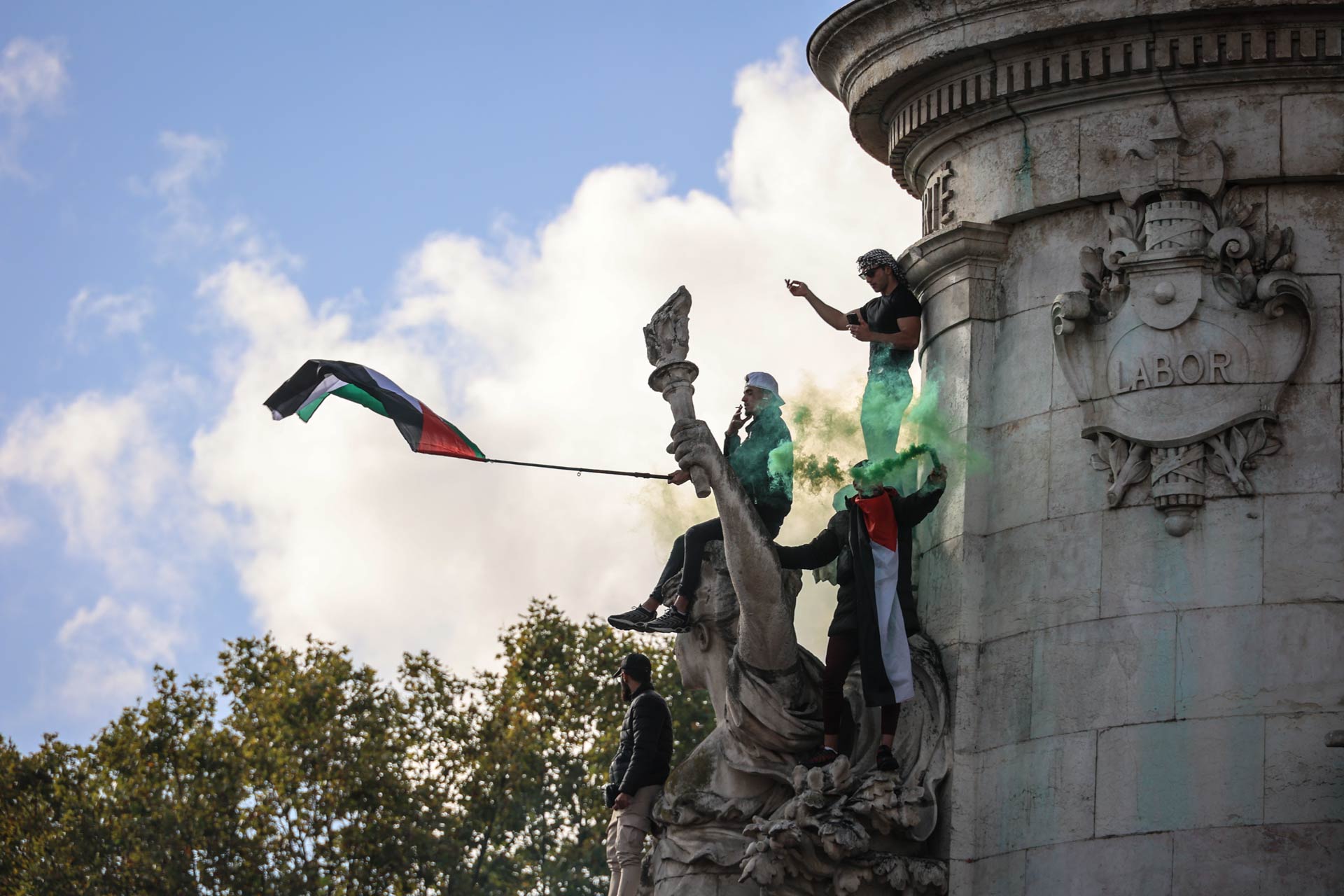

Demonstration in support of Palestine in Paris, October 22, 2023. Photo credit: Timothée Forget
Repression all around
Repressive measures and government statements against supporters of the Palestinian cause in France have been intensifying. Bans on demonstrations, arrests of activists, threats of dissolution, referral to the Public Prosecutor for advocacy of terrorism - it's all part of an effort to silence pro-Palestinian voices, and to create a general taboo in the media.
On the same subject
Several journalists informed inkyfada that they were prevented from dealing properly with the Palestinian question due to directives, either out of fear, or due to a clearly assumed position. At the Altice group, for instance, which includes BFMTV and RMC Sport, the instructions are straightforward. "We received an initial internal e-mail from Arthur Dreyfuss reminding us of the importance of Israel to Drahi. Then someone from management told us that we had to systematically write Israel before Palestine in our stories, because they are the victims," a journalist confided to inkyfada.
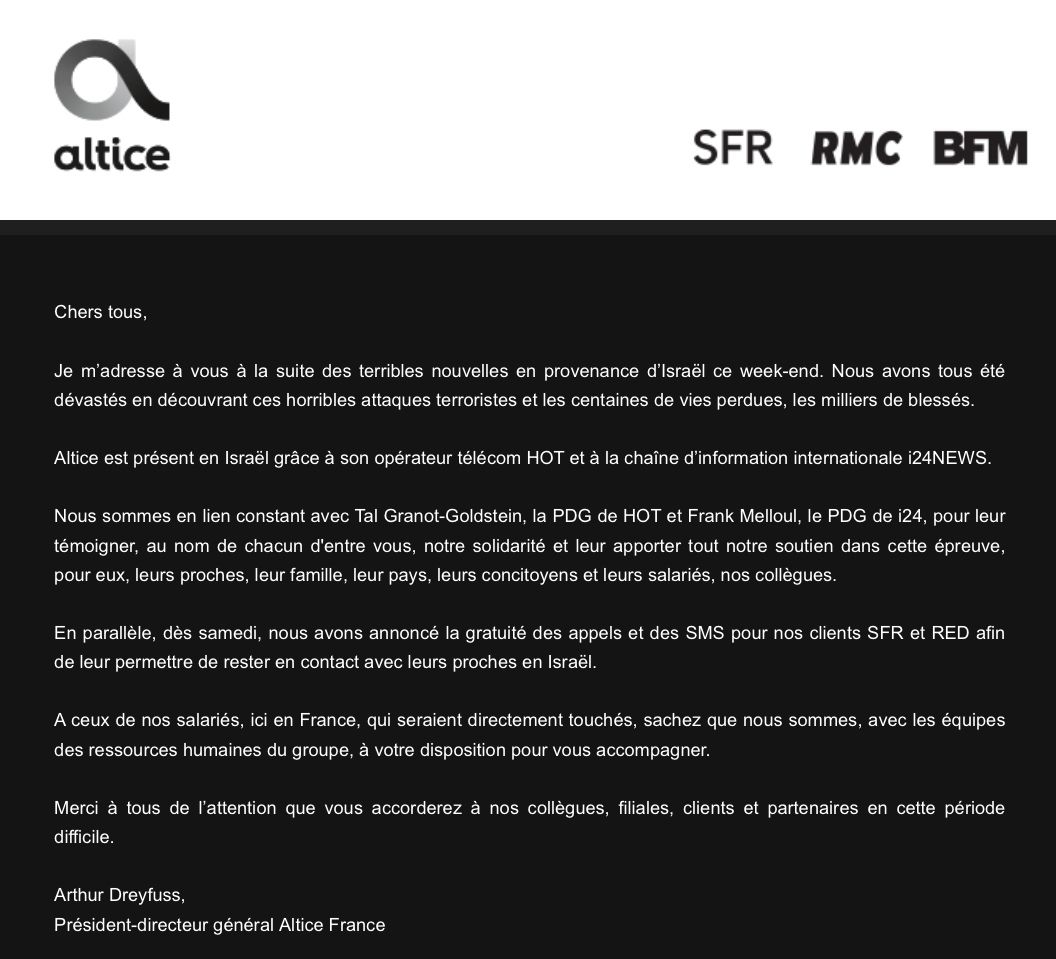
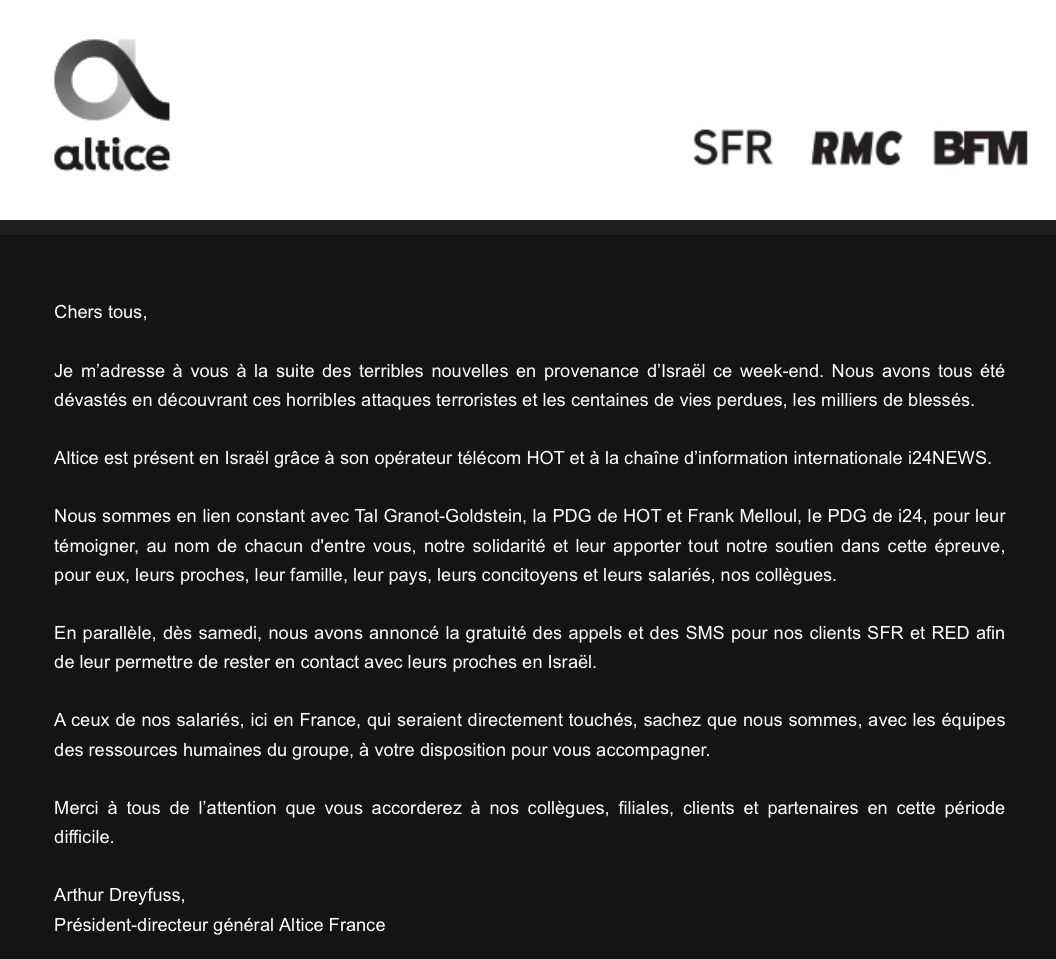
All Altice employees received this e-mail on October 9, stressing the importance of Israel to the group. Meanwhile, Netanyahu has already retaliated and continues to order strikes on Gaza.
The same thing happened at Radio France. Management called in each program presenter, and their message was clear: no one was to speak about the conflict, except "on France Inter and a few news programs". "We were warned to be extremely cautious, and told not to pick sides or we would be sanctioned", one presenter who attended the meeting told inkyfada.
Two CGT activists from the North spent seven hours in police custody for "advocating terrorism" and "inciting hatred" after publishing a leaflet in support of Palestine.
In the leaflet entitled "Ending the occupation is the only way to peace in Palestine", the group declared its "support for the Palestinian people in their struggle against the colonial state of Israel". But the message wasn't well received: "special intervention units of hooded police officers" arrested them at 6 a.m., as denounced in a press release.
"Nobody knows where Mariam might be deported to"
Not long after, Gérald Darmanin's instructions were applied to the letter. Palestinian activist Mariam Abu Daqqa was arrested on Monday October 16, as she was on her way to Toulouse to give a conference on women in Gaza. Pierre Stambul was with her as they headed for the Marseille train station, and gave an account of the events to inkyfada. "After five days in Marseille and Martigues, we left my home to get to the train station. The police intercepted us, showed us the two deportation notices written by Darmanin. It was an unbelievable text that combined the Arras attack, Georges Abdallah, terrorism..."
What's even more worrisome is that the deportation notice doesn't even mention where Mariam Abu Daqqa might be deported to. "Mariam is in Marseille, under house arrest in a hotel at night and with friends during the day. She was very happy to be in France for the first time. Nobody knows where she's going. She's deeply touched by all the people who support her, and extremely angry with the French government", said Pierre Stambul.
And while she was due to visit the National Assembly on November 9 at the invitation of La France Insoumise for the screening of the film Yallah Gaza, which she stars in, Yaël Braun-Pivet, President of the Assembly was strongly opposed to her coming. "Giving the floor to a member of a terrorist organization at the National Assembly would give a platform to violence, hatred and would be a serious attack on our democratic principles, especially in light of the current situation in the Middle East," she justified in a statement.
However, the Paris Administrative Court suspended the expulsion order against her on Friday October 20, holding that "the Minister of the Interior's decision constitutes a serious and manifestly illegal infringement of Ms. Abu Daqqa's freedom of expression and freedom of movement", once again ruling against Gérald Darmanin.
In the meantime, thousands of foreigners, including the Tunisian diaspora, are feeling vulnerable. "Supporting Palestine makes us terrorists," said Omar*, a French-Tunisian who has been living in France for over 20 years. His colleague Tahar* shares this sentiment. The young man is a waiter at a restaurant in northern Paris, and he can't picture a peaceful future in France given the current situation. "Sometimes I think about moving back home, but that would be too shameful. I would become Tahar, the one who failed in France. And then my family and friends need my financial support, so I'm going to fight. But I get the feeling that we're not welcome here..."
